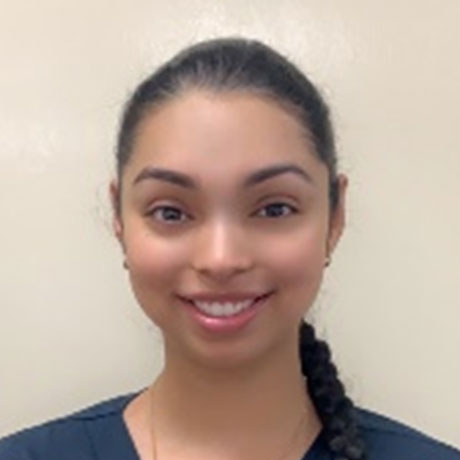Many new graduates often overlook the diverse and unique opportunities in nursing, focusing primarily on conventional areas such as acute ward care, emergency, or intensive care. To gain insight into this trend, I sat down with three graduate RNs working in niche roles. I was curious about their paths: how they got there, what their experiences have been like, and how this starting point has impacted how they see their nursing careers.
“These graduates remind us of the strength and variety of our profession”
— Julia Charalambous MACN
I was surprised to learn how bravely they went into the unknown and how they navigated consolidating their core nursing skills acquired as a student with the new and vast skills their new specialty demands. All in all, these graduates remind us of the strength and variety of our profession and make it known there is no one-size-fits-all approach to a rich nursing career.
In this article, read stories from graduates:

Stephanie Espinoza
Endoscopy
How did you land this role?
I applied through the Queensland Health graduate portal with endoscopy being one of my preferences.
Had you done a placement in endoscopy as a student?
I hadn’t, I had no idea what I was getting myself into if I’m being honest.
What did you know about endoscopy before starting work there?
I knew it was similar to both the day surgery unit, and to peri-op in that there are different areas you can work as an RN. So that’s the two main points why I chose it as a graduate option because peri-op and day surgery are also areas of interest to me.
What surprised you about working in endoscopy?
There is a lot to learn! We’re doing a program in the unit to work through our competencies, with the last stage being working in the procedure room with the doctors. Most of us grads are now assisting and scouting for the procedures. It’s a lot to learn because we have to know about the different procedures and how to troubleshoot the equipment. We get to learn the entire unit from admission, cleaning equipment, procedures, recovery and discharge. It’s pretty cool.
How has being a graduate in endoscopy shaped how you see your nursing career?
I think it’s been a really good graduate program for me to start in. I knew I didn’t want to work in the wards, but this is still a fast-paced nursing environment and there are still lots of core skills we get to practice. Now I can work across the unit, I love being in the procedure room because you get to learn so much about anatomy.
Also, as a student, I struggled with ward placements and I think it can put some students off nursing, even though it’s important and we’re learning our core skills. But there are just so many other options out there and I think it’s okay to have your preferences, to know what you’re not going to like and to look for different places to start your career.

Mitchell Bannah MACN
Gastroenterology Endoscopy
How did you land this role?
I ended up in gastroenterology by applying for a new graduate RN role with Queensland Health and selecting Internal Medicine Services as my first preference. Once I was registered with AHPRA I contacted my first preference hospital’s graduate recruitment team to follow up on opportunities as my Undergraduate Student in Nursing (USIN) position at the same hospital was soon to end and I would be unemployed. By doing this, I was able to gain employment as an RN sooner than a lot of other new graduate nurses.
What did you know about Endoscopy before you started working there?
I knew nothing about gastroenterology or perioperative nursing other than what was covered in approximately 1/3 of a single subject during my undergraduate studies. Unfortunately, education at uni around perioperative nursing was a very small component of the degree.
Had you done a placement in this area?
No. I had never undertaken a placement in a procedural/operative area. I had, however, worked as an Undergraduate Student in Nursing in the Infectious Diseases Day Therapy unit where I would assist with PICC insertions, and this did provide me with a better understanding and application of aseptic techniques and the vitality of correct informed patient consent.
What was something that surprised you about working in this area?
Starting a nursing career in gastroenterology, like any other specialised field, comes with its challenges and potential career negatives. The good things include the flexibility and diversity of working in an area where I must traverse and obtain skills in patient admission, assisting gastroenterologists with procedures, recovering patients in a PACU environment and discharging patients. However, as a new graduate nurse, it is difficult to reinforce and cement learnings from my degree in a procedural environment. Unfortunately, without practicing clinical skills that are not used in a procedural environment (e.g. using IV pumps, wound care etc.) this raises concerns for my future career and its limitations if I were to stay in a procedural area.
How has starting your nursing career in this area shaped what you think your future might look like?
Starting my career in gastroenterology has shaped my future career in positive and negative ways. For starters, I must consciously consider and reflect on my commitment to specialising in gastroenterology at the beginning of my career as this is what is expected in my work unit. I also must consider my future career trajectory and how I can maintain clinical nursing skill currency so that I remain current and employable. Rather than committing to a career in gastroenterology, I focus on transferrable skills and knowledge such as the implications influencing patient flow within a tertiary environment and the adjustments required to accommodate triaging of emergent cases while still delivering scheduled outpatient and inpatient services. Prior to working in Gastroenterology, I was aiming to be a Nurse Practitioner in some capacity. However, since working as an RN in a procedural environment my career plans have changed and are now aimed towards the executive space where I can implement change for the improvement of nursing entitlements and NUM policy education.

Sumaya Mohamad
Peritoneal Dialysis Outpatients
How did you land this role?
I applied directly to the area after graduating and was appointed after interviewing for the position.
What did you know about peritoneal dialysis before starting work there?
I did have some prior knowledge as I was working with a client as an AIN who was receiving peritoneal dialysis. From there I had gotten more interested in starting my nursing career in this specialisation.
Had you done a placement in this area?
No, I had not done any placement doing peritoneal dialysis or in any renal areas.
What was something that surprised you about working in this clinical area?
I was surprised at how busy outpatient settings could get and how much of it was nurse-led especially when it comes to peritoneal dialysis.
How has starting your nursing career in this area shaped what you think your future might look like?
I have been able to develop and expand on my critical thinking skills and continue to build confidence in my own practice. I am excited to see where this will take me in the future.
This article was originally published in the Summer 2023 edition of ACN’s quarterly member publication The Hive. Members can access all past editions of The Hive on MyACN . Non-members can get a sneak peek by viewing our open-access articles.
Are you considering a career in a niche area of nursing? Upskill with one of ACN’s 20 Graduate Certificates, tailored to help you specialise in the area that best aligns with your career goals. If you’re still exploring your options, our 69 Single Units of Study offer a great opportunity to dip your toes into various specialties and find the one that truly resonates with you.
By Julia Charalambous MACN






